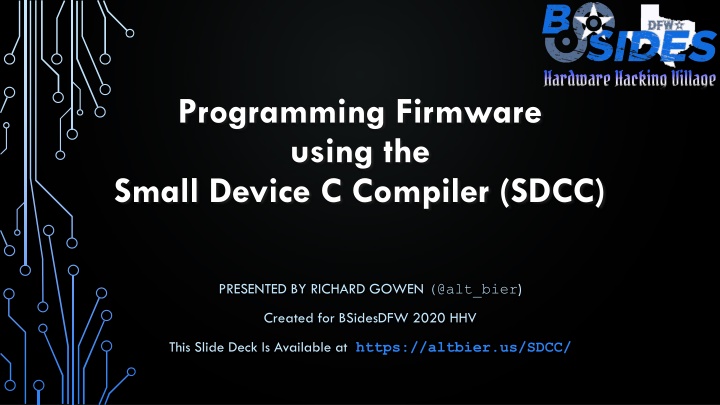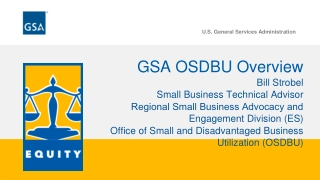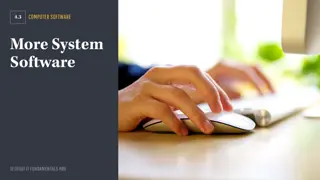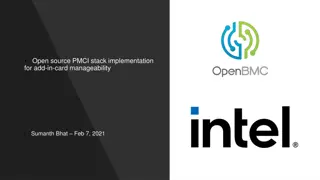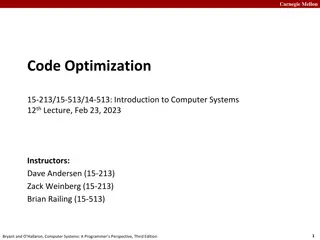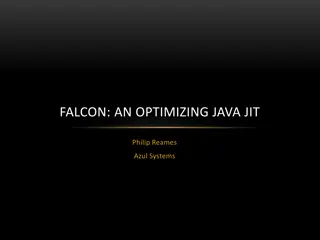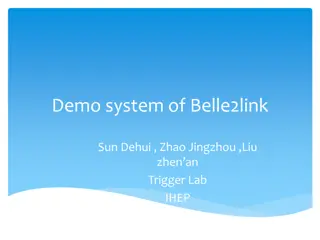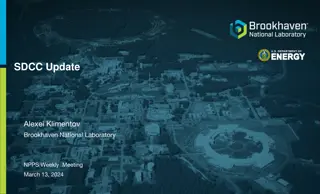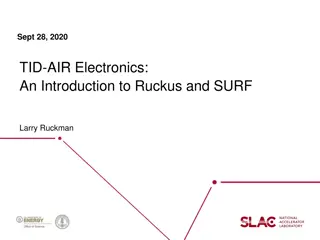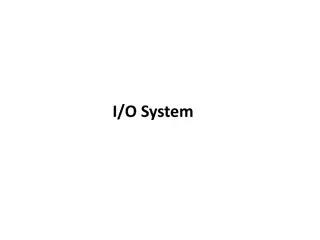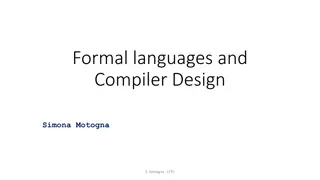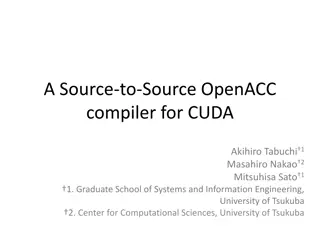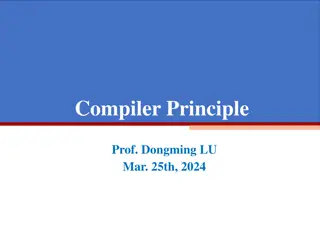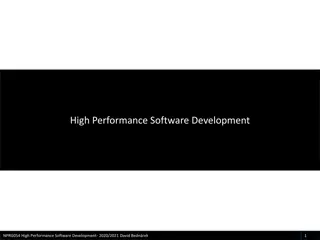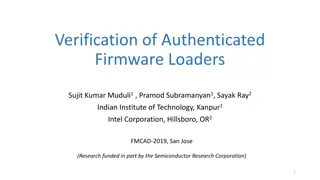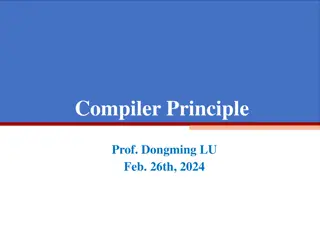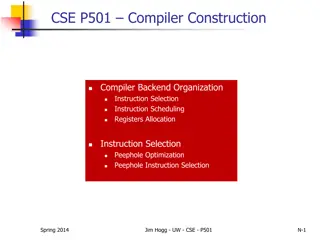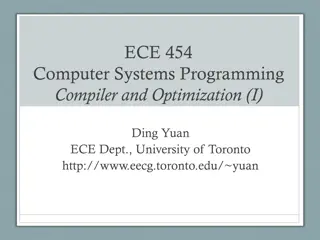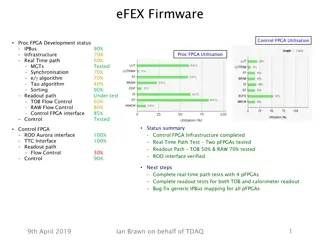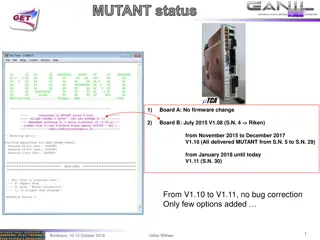Programming Firmware Using SDCC Compiler for Small Devices
SDCC is a retargettable, optimizing C compiler suite for various microprocessors like Intel MCS51, Maxim DS80C390, Freescale HC08, Zilog Z80, etc. Learn how to download, install SDCC, its supporting packages, and the IC chip SDK for firmware deployment.
Download Presentation

Please find below an Image/Link to download the presentation.
The content on the website is provided AS IS for your information and personal use only. It may not be sold, licensed, or shared on other websites without obtaining consent from the author.If you encounter any issues during the download, it is possible that the publisher has removed the file from their server.
You are allowed to download the files provided on this website for personal or commercial use, subject to the condition that they are used lawfully. All files are the property of their respective owners.
The content on the website is provided AS IS for your information and personal use only. It may not be sold, licensed, or shared on other websites without obtaining consent from the author.
E N D
Presentation Transcript
Programming Firmware using the Small Device C Compiler (SDCC) PRESENTED BY RICHARD GOWEN (@alt_bier) Created for BSidesDFW 2020 HHV This Slide Deck Is Available at https://altbier.us/SDCC/
What is SDCC? SDCC is a retargettable, optimizing Standard C (ANSI C89, ISO C99, ISO C11) compiler suite It targets the Intel MCS51 based microprocessors (8031, 8032, 8051, 8052, etc.), Maxim (formerly Dallas) DS80C390 variants, Freescale (formerly Motorola) HC08 based (hc08, s08), Zilog Z80 based MCUs (z80, z180, gbz80, Rabbit 2000/3000, Rabbit 3000A, TLCS-90), Padauk (pdk14, pdk15) and STMicroelectronics STM8. Information and downloads: http://sdcc.sourceforge.net/
Download and Install SDCC is available for several platforms including Windows, MacOS, and Linux. You can download the version for your platform from SourceForge: https://sourceforge.net/projects/sdcc/files/ In the case of Windows, this download will be an installation .exe file. In the case of Linux, this download will be a tarball containing the binaries and an installation script that needs to be extracted and run. For Linux the binaries may be available within your platform s application repositories (e.g. apt install sdcc).
Download Supporting Packages Depending upon your operating system you may need some additional software packages to work effectively with SDCC. For Linux, you are going to want the build-essential package of tools by whichever name you flavor of linux calls them (e.g. apt install build-essential). For Windows, the support tools you will use will depend upon how you work with code on your system. I tend to work in a Linux like environment when coding on my Windows system, and here are the packages I use: Git for Windows: https://gitforwindows.org/ MinGW - Minimalist GNU compiler: https://sourceforge.net/projects/mingw/ Make sure you set your PATH environment variable within the Git for Windows environment so it can find SDCC and make tools
Download IC Chip SDK & Toolchain Depending upon which chip you are working with you will need to download its software development kit (SDK) and its toolchain for firmware deployment. Since different chips have different hardware specification that are called out in SDK libraries and have differing methods of firmware upload it is important to research the correct products for the chip you are working with. For this presentation we will be using the CH552G chip in our examples. This IC chip uses an MCS51 series E8051 core processor which is compatible with SDCC. The CH55x SDK for this IC is available from Blinkinlabs who ported the Keil SDK to SDCC: https://github.com/Blinkinlabs/ch554_sdcc/ Loading the firmware onto the chip can be done using the official WCH program WCHISPTool (Windows) http://www.wch.cn/cn/ (service -->downloads) or via multiple open-source tools such as: LibreCH551 https://github.com/rgwan/librech551 ch552tool https://github.com/MarsTechHAN/ch552tool
Code File Organization While code file organization is a matter of the programmer's taste, I tend to keep the IC specific SDK libraries in their own directory and include them from Make files. You can see from the file list on the right that the include directory holds my SDK files including the chip specific headers and two different program main.c files that are each in their own directory. There is a main Makefile that can compile everything, or I can use the Makefile in each program to compile only its code. There is a common Makefile.include that sets up the toolchain parameters.
The Makefile The Makefile for my firmware programs are simple. Each code directory has a Makefile that will name a target, call main.c, include debug.c from the SDK, and include the toolchain Makefile.include The Makefile in project directory will reach into each subdirectory and execute the Makefile there.
The Toolchain Makefile.include The Toolchain Makefile.include was provided by the SDK. It sets up our CC as SDCC and the WCHISP tool as well as various parameter settings. This should be reviewed for the system you are working on and updated as needed.
The main.c The main.c file for the firmware program will include the SDK header files necessary for what it is using. In this example I am including ch554.h and debug.h from the SDK. These SDK headers will provide the chip specific definitions that we will use in our code. In this example I am calling P3_DIR_PU which is defined in the ch554.h header that we included.
Compile When you are ready to compile the code run make from the code directory.
Upload Firmware to Chip If your code compiled without error, you are ready to upload it to your chip. In my case I will be using the WCHISPTool which takes the .hex file and uploads it to the CH552G chip via a USB connection.
THANK YOU I hope you enjoyed this presentation and learned something from it. -- @alt_bier This Slide Deck https://altbier.us/SDCC/ Code https://github.com/gowenrw/BSidesDFW_2020_HHV/
